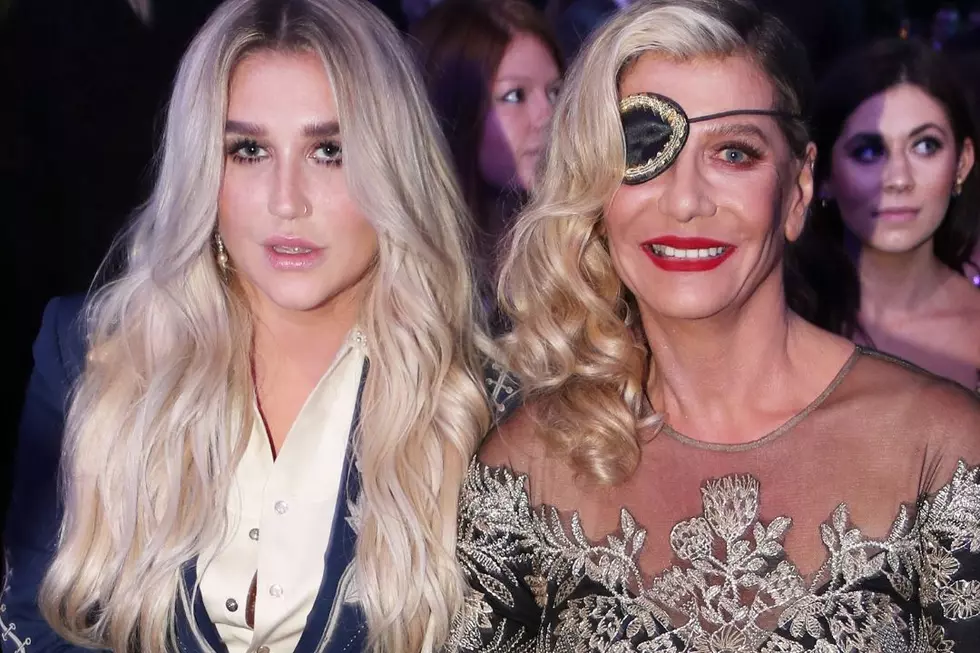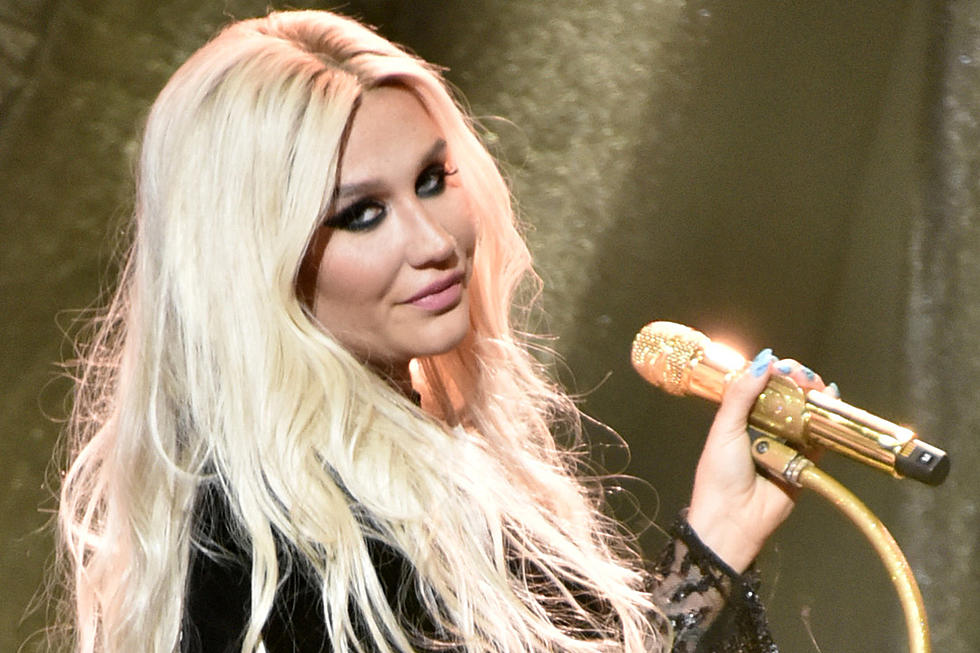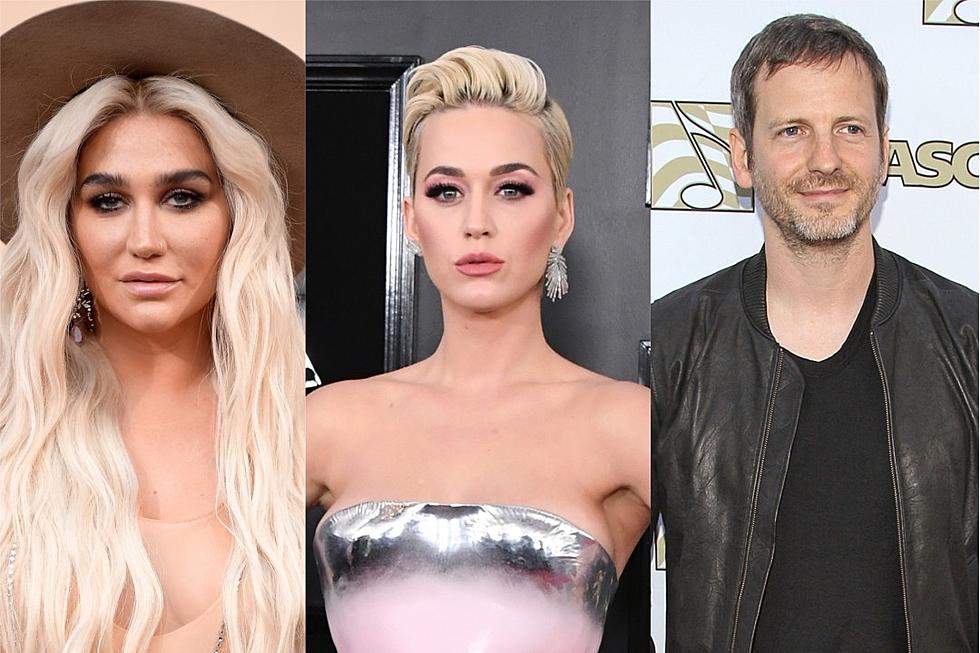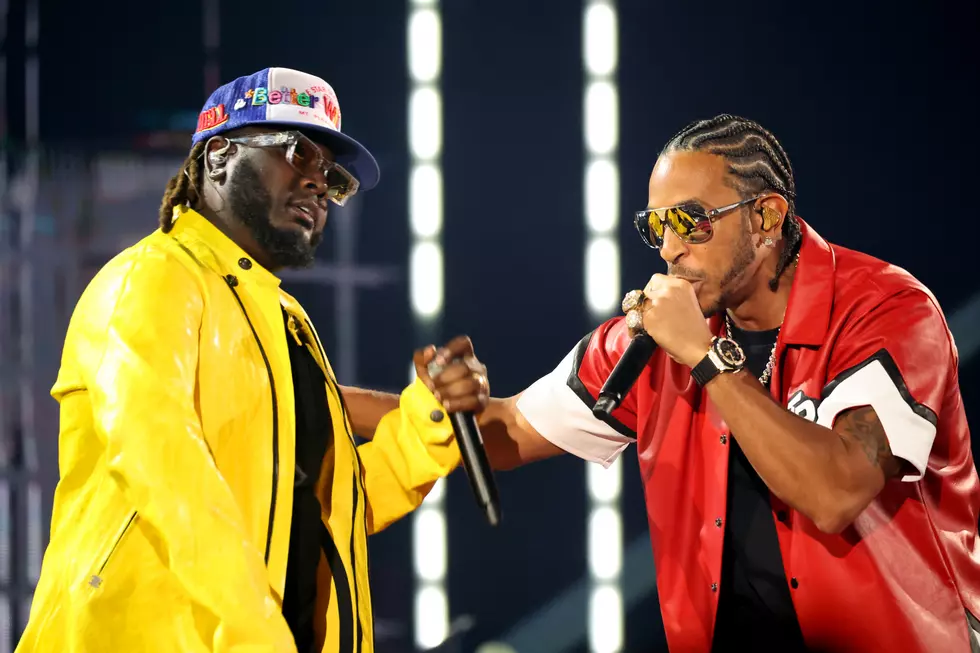
Kesha Rides the ‘Rainbow’ to Freedom on Colorful, Cathartic New Album: Review
Kesha has been to hell and back and lived to tell the tale⎯⎯well, several actually. Rainbow, the artist's deeply-visceral and musically-adventurous new collection of music, is her opus: an assortment of stunningly intimate musings, defying battle cries on womanhood and empowering tributes to the outcasts in search of redemption. She’s been a “prisoner of the past” for far too long, as she sings on "Learn to Let Go," but that pain has led her to freedom.
Following her very public war against alleged abuser and long-time producer Dr. Luke, the now-30-year-old exposes every layer of her healing. She vows to forgive, as she does so bravely with lead single “Praying,” and shakes off her demons completely on other tracks, like on “Learn to Let Go.” Her ascension from tragedy to artistic rebirth is astonishing, and she walks listeners through each stage of her recovery over the past five years, fervently pouring her heart out through the most insightful lyrics of her career.
On Rainbow, she honors her sloshy pop-punk roots (“Let ‘Em Talk,” “Boogie Feet”) but trades up her creative ambitions for gritty alt-country (“Hunt You Down,” “Boots”), blues (“Woman”) and striking singer-songwriter sentiments (“Rainbow,” “Godzilla”). The compositions are earthier, here; her rock-queen vocal heaves into the stratosphere, always on top of the production, knocking you squarely across the chest. Across the record, the spiritual narrative swells from intensely personal to sweeping and universal. With whom Newsweek has dubbed “Lazy Boy” as president of the free world, there is no better time for actual purposeful pop than right in this moment. (Katy, what’s good?)
Rainbow, out August 11, serves as a heart-wrenching love letter to survivors of abuse, too, knit lovingly with empowerment, shimmery optimism and happy endings. Truly, it is in her darkest moments that hope shines the brightest. Across fourteen songs, Kesha comes clean about “the wars, the triumphs, the beauty and the bloodshed, the ocean of human endeavor.” She now rises victorious over her detractors, a slayer of the industry demons and energy vampires who sought to bleed her dry. And so, Kesha is a testament to what happens when you lay claim to your own life and never give up.
Below, we dissect Rainbow, track-by-colorful-track.
“Bastards”
Mounting a comeback is a risk on its own, but to open a record with such a stylistically-ambitious ballad is brave. The T. Rex-influenced jam is doused with alt-country inflections, from the way Kesha flitters into her head voice to the surging ripples of steel guitar that groan like a classic Johnny Cash tune. (The tone of the acoustic guitar borrows a structure often associated with country music, too.) Kesha keeps you on your toes: just when you think you can nail the song down, she begins building the track with a soulful, hippie-smoked layering of harmony and scratchy synth waves that wash over you before you ever have a chance to take a breath. “I could fight forever but life’s too short / Don’t let the bastards get you down / Oh no, don’t let the assholes wear you out,” she hisses. But resentment is not informing her phrasing. Instead, she relishes in the s----talking and resolves to prove everyone wrong. And boy, does she ever.
“Let ‘Em Talk”
Long-time stans, don’t fret: Kesha doesn’t abandon her old stomping ground entirely. Joined by Eagles of Death Metal, a rock outfit out of the late 1990s, the pop star is at her feistiest here. She knows her haters are gonna talk, so why not make them a little jealous? Melting together distinctly more progressive rock with a style akin to “Dirty Love” (from 2012’s Warrior), she begins piecing the past and future together in noticeably exciting ways. “Life is short and we only got one shot / So, let’s go balls out,” she wails over a mighty crest of hardened guitar, buoyant “ooo”s and a raucous Rolling Stones-sized melody. When she snarls up the notes on the pre-chorus, it is evident her transformation into one of today’s most engaging rock singers is final. “Shake that ass / Don’t care if they talk about it,” she commands on the spunky hook. Even when the groove feels eerily familiar, Kesha brings her own unstoppable vigor and brightness, and it feels like she’s shattering the glass ceiling in the process: “We are kings / Life is just a party palace.”
“Woman” ft. the Dap-Kings Horns
With band members who once backed the late, great Sharon Jones, this bluesy number is a direct response to Trump’s gross p---y-grabbing comments. “That made me so infuriated, as a hardcore feminist. Ever since I was a kid and knew what a feminist was, I was a feminist. (I was) raised by a feminist,” the singer explained in an interview. “Once I heard that [comment] I was like, okay, well, I'm going to write this song about being a bad--- motherf---ing woman who you don't want to f--- with.” A grin splashed across her face in the music video for the song, Kesha unfurls one infectious and audacious hook: “I'm a motherf---ing woman, baby all right / I don't need a man to be holding me too tight, I'm a motherf---ing woman / I'm just having fun with my ladies here tonight…I'm a motherf---er.” From her charming and delightful chuckle in the second verse to the visual’s slinked-back breeziness, the song serves as a reminder just how damn strong and fun she is.
“Hymn”
Appropriately hymn-like, this early release stays fairly low-key compared to much of the rest of the album. Its spacey, twinkling synths, soft guitar and pointed fingersnaps frame her drop-down vocal, but it still has enough bite and charm to get your motor running. Dedicated to all the underdogs who feel they don’t really belong anywhere, the smoldering mid-tempo discusses finding one’s own religion and coming to terms with “just the way we’re made.” It is one of many moments, later exalted by “Godzilla” and “Spaceship,” that embodies Kesha’s glorious climb into the heavens, resilient and capable. “Sorry if you’re starstruck / Blame it on the stardust,” she puffs. In an essay on Mic, she wrote, “When I sing the words to this song, I do so as a reminder to myself as much as anyone that we can’t let the haters and the negativity win.”
“Praying”
This gospel-soaked piano ballad, which entered the Top 20 at pop radio this week, stands as Kesha’s best single of her career. “We both know the truth I could tell,” she bellows over a mix of pounding drums, chilled piano and haunting choral harmonies. It’s a lesson that is hard to swallow: choosing to forgive rather than to stay bound to the past. The vibrant visual shows the singer escaping fish nets, defeating two pig-faced perpetrators and climbing to a mountainous summit (Salvation Mountain) emblazoned with “God is Love.” She ultimately finds release, learning to let go and let God, and with that, she is allotted another chance in life. “When I’m finished, they won’t even know your name,” she later caterwauls as the song builds into a frenzied climax. Seemingly about her alleged abuse at the hands of former producer Dr. Luke, she sends up a touching prayer and comes out the other side a renewed human being.
“Learn to Let Go”
Kesha's story seemingly comes full circle on this effervescent tune. Her syncopated vocal, a signature of much of her work, the prominent drums and the hip-hop melody color the album’s best anthem. She chooses redemption over resentment, finally practicing what she preaches. “[I] had a bitterness when I looked back,” she admits, before she pours out buckets of gasoline, throws down a match and lights the whole damn house on fire with the highly-flammable chorus. Later, she muses, “Had a boogeyman under my bed / Putting crazy thoughts inside my head / Always whispering ‘it’s all your fault’ / He was telling ‘no, you’re not that strong.’” In the accompanying music video, she replays some of her favorite homemade movies and reaches back into her childhood to regain some shred of wonder and innocence, giving way to a point of rebirth.
“Finding You”
The album’s sleeper hit, this throwback folk song sees Kesha scavenging through time and space for her other half. She’s living in the here and now⎯⎯“kiss me and tell me I’m fine and forget we’re dying”⎯⎯but she is preparing herself for what comes next. “When I say forever, it’s the god---n truth,” she confirms, sternly promising to find her lover again when their earthly shells crumble back into dust. (“I know forever don’t exist / But after this life, I’ll find you in the next.”) Musically, the song slowly builds into a palpitating rollick with the addition of full-bodied guitar and drums. It’s a bit of a grower but one of the set’s more interesting layers. Kesha’s restraint here is another sterling exhibit of her growth and maturity as a vocalist, pulling back rather than powering straight ahead as you might expect.
“Rainbow”
Here, we finally arrive at the album’s core. The titular cut opens on only Kesha and a piano, quickly expanding with violin, dobro and a choir of backing singers. It could easily be paired with “Learn to Let Go,” as she appears to be singing to her younger self as well as young women seeking to find their way in a world which still undervalues them. “Come and paint the world with me tonight,” she prompts. “I forgot how to daydream, so consumed with the wrong things / But in the dark, I realized this life is short,” she echos, wishing she could make up for lost time. The song is satisfying cinematic, playful but urgent. “I know that I’m still f---ed up but aren’t we all, my love?” she prods. But if you “put those colors on, girl,” you can discover your true destiny: “You gotta learn to let go / Put the past behind you / Trust me I know.”
“Hunt You Down”
Borrowing the gallop of a Waylon Jennings tune (“I’m a Ramblin’ Man”) and the sly wit of Loretta Lynn (“Fist City,” “You Ain’t Woman Enough”), this is the closest Kesha comes to doing straight, whiskey-chased country music. She talks obsessive love, soaked with a sultry vocal and a deadly ultimatum: “Baby, I love you so much / Don’t make me kill you.” (She has devoted her life to someone who may or may not be catting around, and she’s not about to let any man make a fool of her!) Grounded in the past but radically modern, it feels far more authentic than anything currently playing on country radio. (To get an idea, go take a listen to Thomas Rhett’s “Craving You” (with Maren Morris) or Keith Urban and Carrie Underwood’s “The Fighter.”) Yet, it's no surprise given her mother’s link to country songwriting and the stylistic flourishes really fit Kesha like a glove.
“Boogie Feet” ft. Eagles of Death Metal
Anyone else still obsessed with Animal deep cut “Dinosaur”? Us, too. And now, we get to witness what a 2017 version of that would sound like: Warbling and squeaking through the funky and punk-ish melody, Kesha feels the “good vibrations” and offers up some sage advice to haters who seem “mean and nasty” but who are really “just unhappy.” The fiery uptempo is soaked with Jesse Hughes’ spooky tremble and a wall of blustering electric guitar and Beach Boys-style spirit. “Dance with me, please!” rings the chanty, ‘60s-glossed chorus. “Are you scared of these boogie feet?” No, we’re not. Let’s dance!
“Boots”
The second heavily-influenced country song on the record lurches with the screech of a falcon, a strident, heart-throbbing percussion and a Nancy Sinatra-meets-Willie-Nelson swagger. Kesha predictably pushes the envelope, tossing in her glam-pop tendencies but only in tasteful amounts. She handles the mix delicately but with a sense of demanding: “I have boys in every country code / Just a Rolling Stoner on a roll / Bring the cowgirl out and cock ‘em guns,” she licks on the opening verse, the dusty guitar and veiny drum lines floating to the top. Later, she croons in true torch-singing fashion, “I’m walking on air, kicking my blues / Everything stops when I’m with you / So, slide over here, tell me the truth / I know you love me wearing nothing but your boots... / If you can’t handle these claws, you don’t get this kitty!” Again, she demonstrates how easily she can inhabit the well-worn and weathered lifestyle of the country star⎯⎯not today’s urban cowboy, but that of an outlaw from the ‘60s and ‘70s.
“Old Flames (Can’t Hold a Candle to You)” ft. Dolly Parton
Penned by Kesha's mother Pebe Sebert and Hugh Moffatt, this sweeping ballad was originally recorded by Joe Sun in 1978 and made famous by Dolly two years later. The hit No. 1 song is included on the icon’s 1980 album, Dolly, Dolly, Dolly, and while Kesha recorded her own solo version for her 2012 Deconstructed EP, here, she strips away the jarring, unnecessarily dizzying pop production in favor for a vastly countrypolitan flavor, flecked with some trippy and warming synths, tambourine and lonesome steel guitar. Dolly’s feathery vocal is a lovely counterbalance to Kesha’s meatier approach. The two would be wise to release a duets album already. We’d totally buy it.
“Godzilla”
Hearkening to ‘60s and ‘70s-era folk singer/songwriters (think Bob Dylan and John Prine), this cheeky and cleverly-penned ballad about falling in love, exemplified by the pop culture mythology of Godzilla, is consequently the album’s comic relief, masked with sincerity and weighty emotion. It’s so refreshing to know Kesha is still the weird girl who believes in aliens, and without her endearing spirit, we’d all be much worse off. “What do you get when you take Godzilla to the mall? / He scares all the children and treads all the pillows and knocks over walls / His emerald eyes, they sparkle and shine as he eats the food court and steals half my fries,” she winks. While everyone else is “running and screaming” from him, she sticks around to get to know him, even when her mom doesn’t exactly approve. The psychedelic undercurrent glues the narrative together, making for a giddy listen.
“Spaceship”
One of the biggest things you learn across Rainbow is how astute Kesha has become to learning and living country music. Drowning herself in sorrow and letting herself really feel has taken her artistic capabilities to the next level. Her songwriting hasn’t exactly changed much, but her vocal and musical choices hint at far more depth than she has ever gotten credit for. Meanwhile, there is something just so Kacey Musgraves about this closing track’s swirling production, with banjo taking the lead. Meanwhile, her vocal is icy and slides gloomily up and down in much the same way as Lindi Ortega’s finest work (particularly her most recent EP, Til The Goin’ Gets Gone). “I always say when I’m gone, when I’m dead / Don’t lay me down with the dirt on my head / You won’t need a shovel / You don’t need a cold headstone / You don’t need to cry / I’m going to be going home,” she wails in a chilling tone, opining her fascination with lanky space people, as well as the often crippling experience of living and finding her own peace. “It all grows quiet, insignificant / I’m nothing more than recycled stardust and borrowed energy, born from the rocks spinning in the ether / I watch my life backwards and forwards, and I feel free,” Kesha speaks, seemingly reading an epitaph and concluding her journey from darkness into light. She then boards a spaceship which audibly zooms from the Earth’s surface, book-ending one of the best pop vocal albums of 2017.
Kesha's Best Live Vocals:
The Weirdest Album Covers Ever:
More From MIX 108










